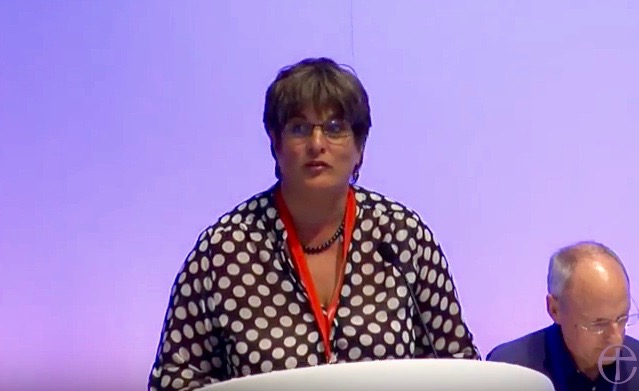Did the Church of England cross the line in York?
'People think that stories are shaped by people,' said the great Terry Pratchett. 'In fact, it's the other way around.'
He was right, of course. And one of the functions of the Bible is to provide the stories that shape the people. We accept them as in some way normative; they are our stories, and we allow them to shape us: our characters, values and the way we respond to moral challenges. Some of these stories are straightforward enough, or at least we think they are; some are dark and dangerous, and if we aren't careful they can shape us wrong. The history of the Church is full of this kind of thing, from Augustine using Jesus' command to 'compel them to come in' to justify the persecution of the Donatists, to spurious complementarian readings of Genesis to justify patriarchy.

But what about the other stories, from outside the Bible, that disturb our peace with their tapping at the window and knocking at the door? This is what happened at last week's Church of England General Synod in York, and the fallout continues.
There were two resolutions that were particularly problematic, both of them – inevitably – to do in one way or another with sex. The first, introduced by Jayne Ozanne, committed the synod to opposing so-called 'gay cure' therapies; the second, to asking the bishops to consider special liturgies to mark the transitions of transgender people.
The first was particularly clever. Only the most hardline conservative thinks homosexuality is a disease to be cured; for most, it is a disorder, with the sin residing in the act rather than the inclination. Stories were told of the terrible things gay people have suffered in misguided attempts to turn them straight. The stories swung it, though the synod was surely politically aware enough to realise that once the motion was allowed, it had to pass: imagine the headlines if it had failed. Such, of course, was the calculation.
Similarly with the second, a request to the bishops for a formal liturgy for transgender transitions. Opponents believe the motion was a Trojan Horse, committing the synod to affirming a particular view of transgender that conservatives do not subscribe to; gender, they say, is fixed, and people with gender dysphoria should be encouraged to come to terms with their 'real' nature rather than helped to change it through dress, drugs or surgery. This is rather more difficult: providing a liturgy to celebrate a transgender transition is rather different from rejecting a 'therapy' no one really thinks will work anyway. In fact, of course, there are plenty of appropriate prayers out there already, and the bishops could – and probably will – just politely decline. But again, there was no theology; and again, the stories were told, heartfelt and moving, about transgender people and what they'd gone through.
It's this process of storytelling rather than hard theological thinking that has led to some conservative Anglicans concluding the Church of England is a busted flush. The blogosphere was alive with denunciation, culminating in a statement by 21 clergy and others saying the CofE had got it seriously wrong at the synod and that they were exploring other options.
There's no doubt that they are very, very angry and worried. They see the current running inexorably in a liberal direction, with faithful pastors struggling to rescue the sheep drifting haplessly downstream.
This is not really true. The resolutions passed by the synod were not much more than virtue signalling (though sometimes it's important to signal virtue); as the Bishop in Europe, Robert Innes, said on his blog: 'Neither vote changes the church's doctrine – and those fearful that orthodox teaching is slipping should be reassured that the membership of the current House of Bishops makes the prospect of doctrinal change remote.'
However, those stories were powerful – and conservatives fear that they will simply out-compete the story of Scripture. The Church of England will make new doctrines based on what feels good. Truth will be reduced to what makes people happy. There's no place left for morally demanding discipleship; you can just redefine morality to include whatever gets you through the night. CofE believers will, in short, be shaped by the wrong stories into the wrong kind of people.
Well: it might happen. But it's not the only way of looking at what took place in York. Because one of the things about stories is that they want to be told. Stories about people matter, because people matter. And there is always, and rightly, a dialogue between human stories and the divine story.
This doesn't mean that human stories should replace scriptural teaching. That's just the sort of flabby, post-theological, emotion-driven, feelgood stuff that so rightly appalls anyone with a sense of historical Christianity. But neither should it be possible for Christian leaders to talk about people without talking to them and hearing from them. There has been altogether too much of that, and if some of the balance was redressed at the synod, it's just as well. We listen to the story of Scripture having heard the other stories too, and sometimes, yes, the other stories affect how we hear Scripture.
Has the CofE crossed a line? No. But going forward, there are challenges to both liberals and conservatives. For liberals, it's how to square their thoroughly modern views on sexuality with the internal logic of revealed Christianity. For conservatives, it's how to offer gay and transgender people bread rather than stones. For both, it's about finding a way to listen to powerful stories without being entirely overpowered by them. Stories shape people; but we shape stories, too.
Follow Mark Woods on Twitter: @RevMarkWoods











